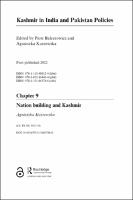Chapter 9 Nation building and Kashmir
| dc.contributor.author | Kuszewska, Agnieszka | |
| dc.date.accessioned | 2022-05-12T08:12:04Z | |
| dc.date.available | 2022-05-12T08:12:04Z | |
| dc.date.issued | 2022 | |
| dc.identifier.uri | https://library.oapen.org/handle/20.500.12657/54352 | |
| dc.description.abstract | "The presupposition that Muslim-majority regions of India had to be incorporated into the newly established Muslim state in 1947, constituted key point Pakistan’s international narrative, and incessantly cast a shadow on its official discourse. The two-nation theory, used by the proponents of Pakistan’s inception as a nation building political concept, artificially projected the Indian Muslims as a monolithic group, irrespective of their origin, social belonging, historical heritage, etc. This ideologically rooted discourse heralded future tensions within Pakistan and provided framework for Pakistan’s persistent pretension of acting as defender of Kashmiri Muslims rights. Pakistan’s stance on Kashmir, is unalterably based on key twelve components, which exemplify the India-centric components of its geostrategic objectives. In the aftermath of Bangladesh inception, Pakistani policymakers reinforced their determination to maintain and justify the ideological relevance of the two-nation theory and to combine it with security-dilemma vis-à-vis India. The chapter investigates the campaigns of authoritarianism and Islamization, fundamentally transforming Pakistan, which were introduced primarily by General Zia ul-Haq’s military regime, their impact on Pakistan’s socio-political transformations and its stance on Kashmir." | en_US |
| dc.language | English | en_US |
| dc.subject.other | human rights, India, Pakistan, Kashmir, Law, geopolitical tensions, Kashmir relations, Kashmir conflict | en_US |
| dc.title | Chapter 9 Nation building and Kashmir | en_US |
| dc.type | chapter | |
| oapen.identifier.doi | 10.4324/9781351063746-11 | en_US |
| oapen.relation.isPublishedBy | 7b3c7b10-5b1e-40b3-860e-c6dd5197f0bb | en_US |
| oapen.relation.isPartOfBook | ba481b14-b6c6-47c2-a502-2402233570b2 | en_US |
| oapen.relation.isbn | 9781138480124 | en_US |
| oapen.relation.isbn | 9781032164434 | en_US |
| oapen.imprint | routledge | en_US |
| oapen.pages | 40 | en_US |
| oapen.remark.public | Funder name: Jagiellonian University in Krakow, Poland/Project Acronym: Priority Research Area Society of the Future: “Excellence Initiative –Research University” at the Jagiellonian University in Krakow, Poland. | |
| peerreview.anonymity | Single-anonymised | |
| peerreview.id | bc80075c-96cc-4740-a9f3-a234bc2598f1 | |
| peerreview.open.review | No | |
| peerreview.publish.responsibility | Publisher | |
| peerreview.review.stage | Pre-publication | |
| peerreview.review.type | Proposal | |
| peerreview.reviewer.type | Internal editor | |
| peerreview.reviewer.type | External peer reviewer | |
| peerreview.title | Proposal review | |
| oapen.review.comments | Taylor & Francis open access titles are reviewed as a minimum at proposal stage by at least two external peer reviewers and an internal editor (additional reviews may be sought and additional content reviewed as required). |

